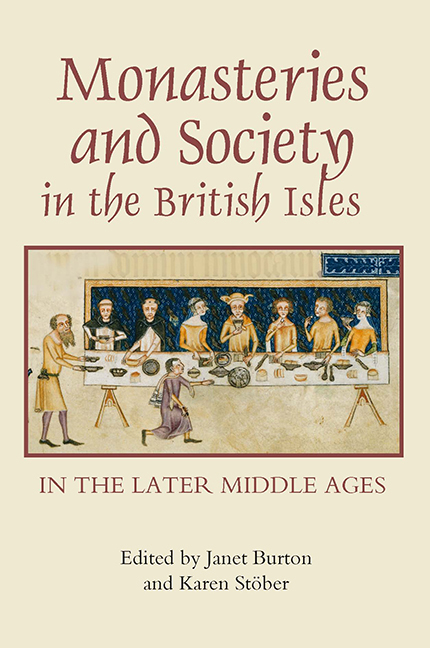Book contents
- Frontmatter
- Contents
- List of illustrations
- Acknowledgements
- List of contributors
- Abbreviations
- Introduction
- The Meeting of the Worlds
- Religious Houses and their Patrons and Benefactors
- Female Communities: Nuns, Abbesses and Prioresses
- Monasteries and Education
- 10 Monasteries and secular education in late medieval England
- 11 ‘Make straight in the desert a highway for our God’: Carthusians and community in late medieval England
- Monasteries and Urban Space
- Religious Houses in the Regions
- Index of Religious Houses mentioned in the text
- Index
- Miscellaneous Endmatter
10 - Monasteries and secular education in late medieval England
from Monasteries and Education
Published online by Cambridge University Press: 24 October 2017
- Frontmatter
- Contents
- List of illustrations
- Acknowledgements
- List of contributors
- Abbreviations
- Introduction
- The Meeting of the Worlds
- Religious Houses and their Patrons and Benefactors
- Female Communities: Nuns, Abbesses and Prioresses
- Monasteries and Education
- 10 Monasteries and secular education in late medieval England
- 11 ‘Make straight in the desert a highway for our God’: Carthusians and community in late medieval England
- Monasteries and Urban Space
- Religious Houses in the Regions
- Index of Religious Houses mentioned in the text
- Index
- Miscellaneous Endmatter
Summary
At the Dissolution of the Monasteries, as aspirational gentry and territorial nobility pestered Cromwell and his master for their portion of the spoil, an altogether more altruistic proposal emerged from the circle of humanist scholars and moderate reformers assembled around the king: the former abbeys and priories should be transformed into public schools not only for the social elite but also for the benefit of the whole commonweal. The precedents for such a proposal were clear. Since the Black Death several ecclesiastical and secular patrons had recycled monastic resources for the purpose of scholastic foundations. The most conspicuous contemporary case was perhaps also the least auspicious, since Wolsey's sequestered colleges at Ipswich and Oxford were incomplete, but it is possible the reformers were also aware of the greater progress of their continental counterparts, where schools and seminaries had already risen from the shells of surrendered monasteries. There is no doubt their plan was also underpinned by a powerful commitment to the cause of humanism, which had been promoted so far only in a handful of high profile schools. Their primary impulse, however, was surely the conviction, shared by many in early Tudor England, that the monasteries had abandoned their traditional role as centres of education for the whole Christian community. The reformers fondly imagined a remote past when monasteries earned their endowments serving as beacons of education and enlightenment in an otherwise barren landscape. But in their own time it was widely believed the monks had withdrawn behind their precinct walls to waste their resources upon themselves: ‘they [i.e. the possessioners] are gloriously self satisfied’, wrote Erasmus of Rotterdam, ‘they believe it is the highest form of piety to be so uneducated they cannot even read’.
The view of the monasteries as an obstacle to the spread of education – and of the Reformation as the first great stimulus to it – persisted for generations after these public and scholarly debates had subsided.
- Type
- Chapter
- Information
- Publisher: Boydell & BrewerPrint publication year: 2008



